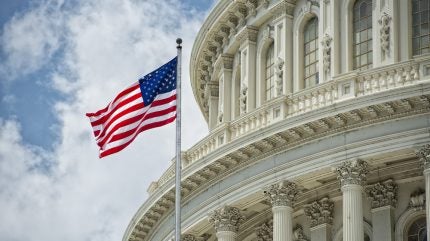
With just 15% of clothing in the US currently recycled or reused, and the rest sent to landfill or incinerated, the representatives say they plan to use legislation to curb the harms of fast fashion while helping families and producers.
The Slow Fashion Caucus announced its founding principles at the launch event, where fashion industry representatives were also present.
The founding principles of the caucus are:
- Bringing textile production back to into the US
- Incentivising the apparel sector to promote the reuse, repair and recycling of textiles
- Supporting the increased use of sustainable fibres
- Promoting textile reuse and recycling infrastructure
- Developing circular economy policies to drive the apparel industry to reduce natural resource consumption
- Building public awareness of fast fashion’s environmental impact
- Expanding initiatives across federal agencies to encourage textile sustainability.
Representative Gluesenkamp Perez said in a statement: “High-quality American-made clothing isn’t just inherently stylish – it’s a core part of building wealth in the middle class. When I have to replace work boots every year, rather than a quality pair that can last for years, my family loses out. The purest form of environmentalism is to use less and be a good steward of your stuff – rather than buying new clothing that’s designed to be disposable.
“These items can contain toxic chemicals and PFAS, and they’re predominantly made from synthetic fabrics that shed microplastics, unlike natural fibres. Instead of putting our kids in pyjamas with chemical flame retardants, we should be looking to naturally resistant alternatives like wool. I look forward to working with the Slow Fashion Caucus to bring manufacturing jobs home and support a cultural shift toward durable, safe clothing for working families.”
Gluesenkamp Perez has been the representative for Washington’s 3rd congressional district since 2023.
In January 2024, Washington followed New York and California’s lead and introduced a bill to tackle the environmental impacts of fashion including pollution and carbon emissions.
Representative Pingree, chair of the Slow Fashion Caucus, added: “For too long, the so-called ‘fast fashion’ industry has been given free range to pollute our planet, exploit workers, and shortchange consumers. In fact, textile waste is one of the fastest-growing waste streams in the US and is responsible for more carbon emissions than all international flights and maritime shipping combined. The launch of our Slow Fashion Caucus marks a new era in the fight against climate change and sends a clear message that Congress will not stand by as the harmful fast fashion industry flies under the radar to destroy our planet.
“It doesn’t have to be this way. As lawmakers, we can create incentives for the apparel industry and consumers to reduce natural resource consumption and engage in reusing, repairing, rewearing, and recycling textiles. I am eager to get to work and thankful for the widespread support of sustainable style advocates, industry leaders, and, of course, my fellow Members of Congress who are joining me in this new effort to rein in fast fashion pollution. This is just the beginning!”
Analysis by Safer States revealed in February 2024 that at least 36 states in the US will consider placing new restrictions on the use of toxic chemicals, including PFAS and plastics.



